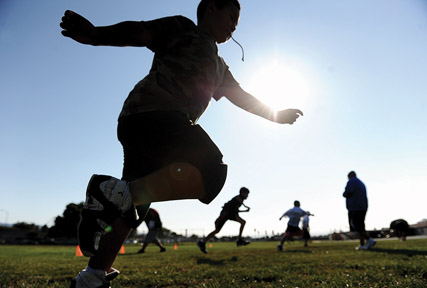
Coaching Alliance speaks at gang prevention meeting
Coaching Alliance speaks at gang prevention meeting
The gang prevention policy taskforce invited a guest speaker from the Positive Coaching Alliance to speak at a recent meeting.
“It’s not a logical leap,” Al De Vos said, between gang activity and youth sports. “But when you are looking at gang prevention, you are looking at how to keep more youth engaged in more positive activities. One way is bringing the Positive Coaching Alliance because it becomes about more than sports – its life-building skills.”
The Positive Coaching Alliance is a nonprofit founded at Stanford University that works with leadership, coaches and parents as well as athletes to make the sports experience more enjoyable. The programs work with youth and high school sports programs.
“Our term is ‘double-goal coaches,’” said Brian Watson, of the Positive Coaching Alliance. “They strive to win, but use it to teach life lessons and develop character.”
Watson said when coaches think back on their legacies, they don’t think about undefeated seasons but about the kids who are grown up and established in the community.
“If you had that individual in Little League, you can think about the impact you have on your team at the end of the season,” Watson said. “For coaches, one of the most gratifying things they can find is to have the entire team of kids reregister.”
Two representatives from local sports leagues attended the meeting, one from the Tri-County Rebels and another from Hollister Heat, also on the prevention policy committee.
“I spoke with them after the meeting and they said their leagues are already doing some of the Positive Coaching Alliance programs,” De Vos said.
He said the Tri-County Rebels representative credited the program with helping them keep up enrollment.
“Before they had to work to get the same number of participants,” De Vos said.
Watson said retention is a common problem in youth sports. He said a recent study found that 70 percent of kids drop out of sports by the time they are 13.
He said the programs focus first on the leadership of a youth program, such as the board of directors.
“Leadership really is about being active culture shapers,” Watson said. “It’s not easy and it’s not anything that happens overnight. Really the culture we strive to establish with any one organization is a three-to-five-year incremental process.”
Part of it also comes down to training coaches on how to try for the win, but also offer positive messages when the team does not win. Watson said parents can also learn from the programs.
“We know parents mean well and want what is best for their son or daughter,” he said. “This gives structured guidelines of what they can do to motivate their child in healthy ways and show unconditional support on the sidelines.”
Positive Coaching Alliance also offers programs that work directly with the athletes, such as a student athlete workshop for high school-age kids.
“They can benefit the sport, but they can have an impact on society as a whole,” Watson said. “They can take a stance against bullying in school and use their power and influence as athletes – it can be influential with other students on campus.”
De Vos said that he will be working to connect the Positive Coaching Alliance with local schools.
“In looking at prevention it’s about how to make programs inclusive,” De Vos said. “Because of costs or budget cuts, the sports programs tend to tailor to youth who have been in sports a long time or who are highly competitive.”
He said he would like to see more youth involved.
“Prevention is trying to reach as many kids in a positive way as we can,” he said.
For sports leagues or local schools interested in finding out more about the Positive Coaching Alliance, visit www.positivecoach.org or call 1-866-725-0024









